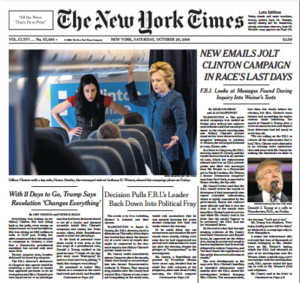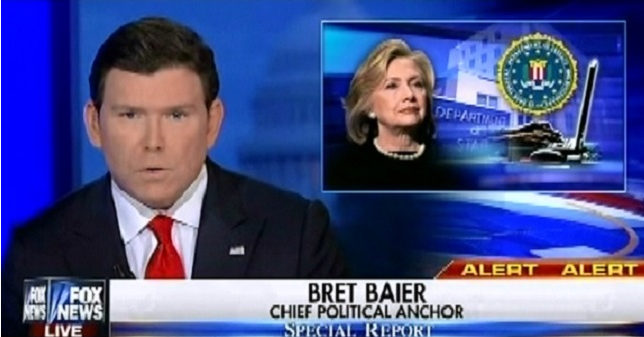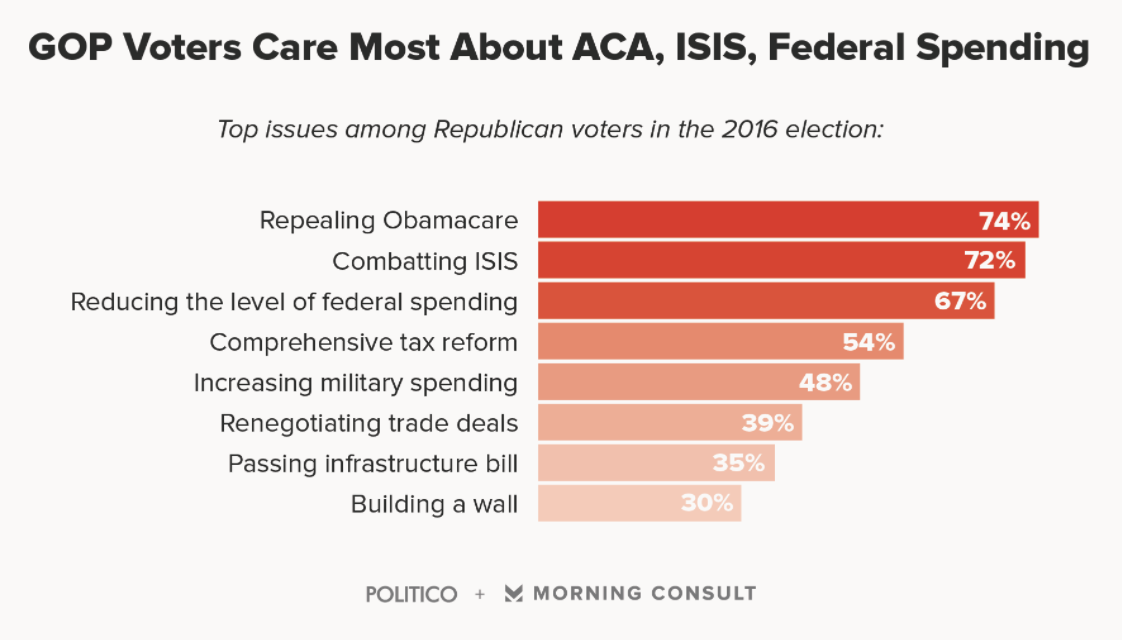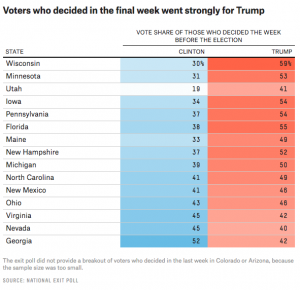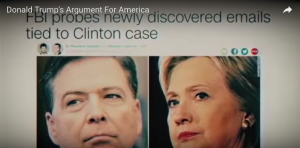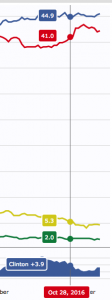Please consider a donation to support this work — we’ve got a long haul ahead
When I learned yesterday that, in addition to “purging” Mike Rogers, Trump had added Devin Nunes and Crazy Pete Hoekstra to his transition team (thus replacing Rogers with both his predecessor and successor as House Intelligence Chair), I wondered whether the Benghazi report had something to do with the exchange. As I noted when the House Intelligence Committee’s report came out, Nunes repeatedly asked questions that Rogers cut short.
The NYT confirms that that is, indeed, one of the reasons Rogers got purged.
One member of the transition team said that at least one reason Mr. Rogers had fallen out of favor among Mr. Trump’s advisers was that, as chairman of the House Intelligence Committee, he had overseen a report about the 2012 attacks on the American diplomatic compound in Benghazi, Libya, which concluded that the Obama administration had not intentionally misled the public about the events there. That report echoed the findings of numerous other government investigations into the episode.
The report’s conclusions were at odds with the campaign position of Mr. Trump, who repeatedly blamed Hillary Clinton, his Democratic opponent and the secretary of state during the attacks, for the resulting deaths of four Americans.
In point of fact, the Additional Views that Rogers released with three other Republicans on the committee (but not Nunes) did find,
Senior U.S. officials perpetuated an inaccurate story that matched the Administration’s misguided view that the United States was nearing victory over al-Qa’ida.
The Additional Views also blamed State for ignoring safety concerns in Benghazi.
So that may not be the key difference between Rogers and Trump with regards to the Benghazi report.
Instead, consider what the report did not say about CIA’s facilitation of Saudi, Qatari, and Turkish arms transfers to Syria during this period — and Nunes’ attempts to push this issue further.
The report concludes that, “The CIA was not collecting and shipping arms from Libya to Syria.” It then explains how it proved this, noting that all witnesses (it sourced its reports only to security personnel and the Benghazi base chief, not the officers at the Annex) said they had not seen any non-CIA weapons at the Annex. But then it said:
From the Annex in Benghazi, the CIA was collecting intelligence about foreign entities that were themselves collecting weapons in Libya and facilitating their passage to Syria.
Here’s what the transcript of the committee’s interview with Mike Morell and the other intel bosses actually shows (page 15):
Mr. [Devin] Nunes: Are we aware of any arms that are leaving that area and going into Syria?
Mr. Morell: Yes, sir.
Mr. Nunes: And who is coordinating that?
Mr. Morell: I believe largely the [redacted–right length for Saudis] are coordinating that.
Mr. Nunes: They are leaving Benghazi ports and going to Syria?
Mr. Morell: I don’t know how they are getting the weapons from Libya to Syria. But there are weapons going from Libya to Syria. And there are probably a number of actors involved in that. One of the biggest are the [redacted–could be Qataris]
Mr. Nunes: And were the CIA folks that were there, were they helping to coordinate that, or were they watching it, were they gathering information about it?
Mr. Morell: Sir, the focus of my officers in Benghazi was [redacted], to try to penetrate the terrorist groups that were there so we could learn their plans, intentions and capabilities
Mike Rogers then interrupts because not everyone in the room is cleared to hear about what the CIA was doing in Benghazi. (Note, Fox’s Catherine Herridge also covered this here.)
Four months later, in a follow-up interview of Morell (file one, file two, at the break), Nunes picked up that line of questioning again. Having gotten Morell to state that there were weapons for security folks at the annex, he tries to clarify that none of these were being sent on. Mike Rogers again interrupts to offer “clarification,” though it becomes clear that on at least one occasion the CIA facility was used to transfer weapons.
The Chairman: There may be an exception, but that was not the rule.
So at the very least CIA was watching its allies send weapons from Libya to Syria, which given the clusterfuck in Syria — most notably the possibility that these weapons are now in the hands of ISIL — may be one reason to moderate the report.
That is, the interviews behind the report include clear evidence that the CIA was watching our allies run arms to Syria (and note, even there, Morell stopped short of saying the CIA wasn’t directly involved). Evidence that Nunes had a particular interest in pursuing.
Now consider a pair of rather famous DIA reports — reports done at a time that Trump advisor Mike Flynn was running the agency — on how the US ended up on the same side as al Qaeda in Syria.
What did the CIA know and when did they know it?
That’s the real question that ought to be raised by a recently declassified Defense Intelligence Agency (DIA) report, obtained by Judicial Watch in a Freedom of Information Act lawsuit. The August 2012 document describes how the U.S. ended up on the same general side in the Syrian Civil War as Al Qaeda in Iraq, the predecessor to ISIS. “AQI supported the Syrian opposition from the beginning,” the report explained. Meanwhile, “[w]estern countries, the Gulf states, and Turkey are supporting” rebel efforts against the Assad regime in a proxy war, putting them on the same side as, if not working together with, the terrorists now overrunning Iraq.
Some outlets have concluded that this means “the West intentionally sponsored violent Islamist groups to destabilize Assad.”
But as Juan Cole counters, the report that western powers supported rebels “doesn’t say that the US created sectarian groups and it does not say that the US favors al-Qaeda in Syria or the so-called ‘Islamic State of Iraq.’” Cole continues, “It says that those powers (e.g. Turkey and the Gulf monarchies) supporting the opposition wanted to see the declaration of a Salafi (hard line Sunni) breakaway statelet, in order to put pressure on the al-Assad regime.”
In a nutshell, Cole argues that the U.S. didn’t support Al-Qaeda in Syria directly. But its allies certainly did.
Two months after the report laying out AQI support for the rebels — another of the documents obtained by Judicial Watch shows — the DIA provided a detailed description of how weapons got shipped from Benghazi to Syria, presumably for rebel groups. “During the immediate aftermath of, and following the uncertainty caused by, the downfall of the [Qaddafi] regime in October 2011 and up until early September of 2012,” the report explained, “weapons from the former Libya military stockpiles located in Benghazi, Libya were shipped from the port of Benghazi, Libya, to the ports of Banias and the Port of Borj Islam, Syria.”
The report obtained by Judicial Watch says that the weapons shipments ended in “early September of 2012.” But note what event this second report conspicuously does not mention: The Sept. 11 attack on the State Department and CIA facilities in Benghazi at the same time that the flow of weapons stopped.
By all appearances, the Benghazi attack interrupted a CIA effort to arm the rebels in Syria that the US government acknowledged were allied with al Qaeda.
That’s what the Rogers-directed HPSCI report did not include.
Just as importantly, this fits in with what Flynn has said during the campaign [RT link intentional]. which is where Trump got the claim that Obama (and Hillary) “created” ISIS.
In addition, recall that in Flynn’s wake, DIA whistleblowers revealed that their more pessimistic take on ISIS was getting softened before it got to CentCom bosses.
Two senior analysts at CENTCOM signed a written complaint sent to the Defense Department inspector general in July alleging that the reports, some of which were briefed to President Obama, portrayed the terror groups as weaker than the analysts believe they are. The reports were changed by CENTCOM higher-ups to adhere to the administration’s public line that the U.S. is winning the battle against ISIS and al Nusra, al Qaeda’s branch in Syria, the analysts claim.
That complaint was supported by 50 other analysts, some of whom have complained about politicizing of intelligence reports for months. That’s according to 11 individuals who are knowledgeable about the details of the report and who spoke to The Daily Beast on condition of anonymity.
You can see where this is going. One of the first things Trump has done has been to ensure agreement in its national security team on this point: that by letting our Middle Eastern allies arm al Qaeda-allied fighters, the Obama Administration created the mess that is in Syria.
And unanimity on that point — accompanied by what is sure to be a very ugly campaign of recriminations against the Obama Administration for cooking intelligence (even aside from the merit of this claim, Flynn has been bitter about his firing for what he sees as objecting to this cooked intelligence) — will provide the basis for Trump to work with Putin on ending the civil war in Syria to Bashar al-Assad’s advantage.
